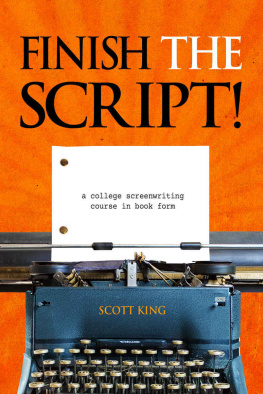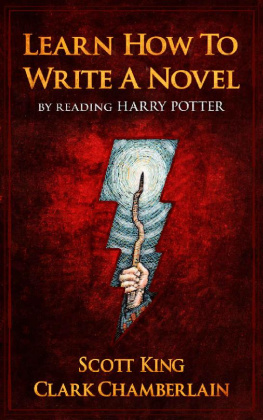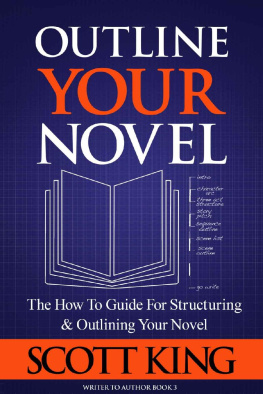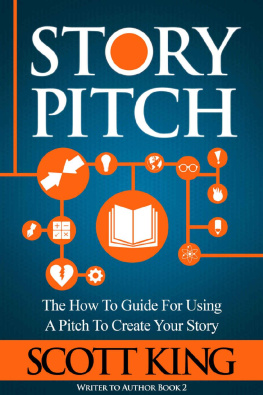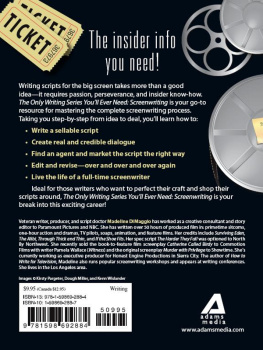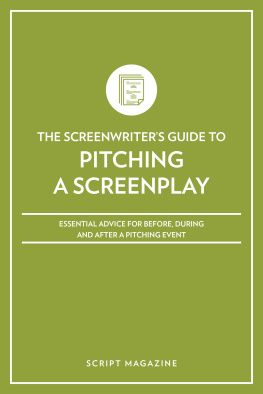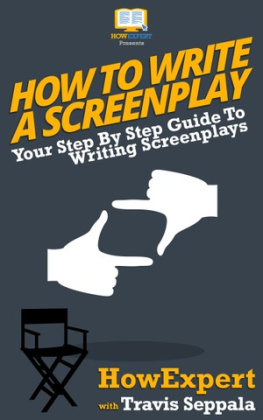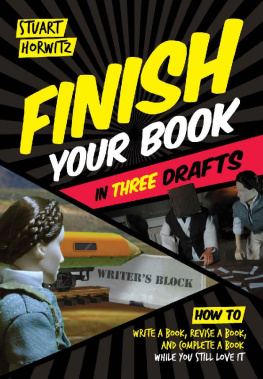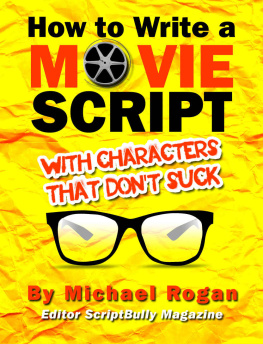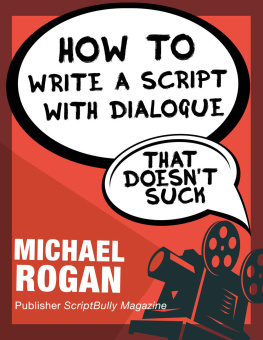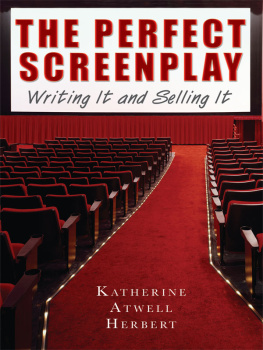Finish the Script!
Introduction
Hey, you.
So here we are, you and I. In many ways, this is like a first date. We are getting together in a common place, the Introduction, and we are both judging each other, trying to figure each other out.
SNARFLAX!
You see that? That was your fault. Because I knew you were judging me, I got all self-conscious and felt the desire to show off. So maybe it would be best if we both go into this by being honest and putting all our cards on the table. That sound good?
There is only one thing Im hoping to get from this relationship no, not that! Whats wrong with you? This is a PG-rated book. Get your mind out of the gutter. Geez.
I want to help you. Thats it.
I went through the system growing up the educational system. It was really bumpy at times. In both undergraduate and grad school, I had classes that were a complete bust. There were full semesters when I asked myself, This is what Im paying for? But along the way there were a few special classes with the most amazing professors. I met people who literally helped shape who Ive become as an artist and a creator. And thats what I want to do for you on your journey to becoming a writer. I want to open doors and help you see stories in ways you never have.
If that sounds OK with you, then lets get started.
How to Use This Book
The number one thing I say to my students is Finish the Script. It sounds so simple, but its not. It takes a lot of patience and a lot of willpower to finish a first draft, and then it takes even more to go back and do a rewrite. If you actually finish that rewrite, you will easily be ahead of the other 97% of people who are just wanna-be writers. So if you ever get stuck throughout this whole process, just imagine me screaming in your ear, FINISH THE SCRIPT! If for some reason youre imagination challenged (which would be weird because clearly you want to learn how to be a writer, which automatically implies that you have a vivid imagination) then fake it.
In many ways, this book is set up just like my college writing class. Most chapters start with an introduction that is often anecdotal or silly. Normally, when I start class, I tell a funny story about my latest exploits and adventures. Its a good icebreaker that gets everyone warmed up and paying attention for the day. Thats when I jump in with the lecture. Sometimes they are short, and sometimes they are really long. Ive always let the subject matter dictate the length. When Im done with the lecture, I give my students an assignment, and its up to them to get it done. The chapters in this book will work the same way.
The one thing I want you to keep in mind throughout this whole journey is that there are no real rules when it comes to writing. Writing is a personal thing. A process that works for one person may not work for someone else. A perfect example is that Im a morning person. I wake up early, and Im sharper and more focused in the first few hours of the day than at any other time. As a result, its best for me to do my writing in the morning. The flip side is that I know tons of fabulous writers who stay up really late and do all their real writing between 11 p.m. and 4 a.m. Writing in the morning doesnt make me better than people who write at night, because there is no right or wrong. There is only what works best for you.
Im going to throw a lot of different lectures and assignments at you, because one of the first steps to becoming a writer is learning what works for you. Sometimes the assignments are going to click and make perfect sense, and sometimes they will feel like a real chore. Thats OK. Thats how its supposed to be. Just suck it up, get it done and finish the script!
Keep in mind too that this isnt a book on how to break into the business, and Im telling you upfront that no one learned how to write a screenplay solely from a book. Scriptwriting books dont replace the act of scriptwriting. My goal here is to start you on the learning process, and just like any kind of writing, most of your success will depend on you. You have to be willing to put in the time and be open minded. You have to have the determination to finish it, because me writing Finish the Script! will get you only so far without you doing the work you need to do. But thats OK, because I believe in you.
1
Finding the Idea
The first movie I worked on was Runaway Bride. I was in high school and I got the job by manipulating myself into it. I was working on the high school newspaper, and when we heard that a big-studio movie was going to film in our small town, I knew right away that I wanted to write the article about it. Our advisor didnt think that was a good idea, since she considered me a weird duck and didnt want me embarrassing the school. I didnt let that stop me.
My family owned a restaurant in Berlin, Md., where the movie was filmed. That meant that when the town council had a session with business owners to vote on whether to allow the movie to be filmed in Berlin, I got myself into that meeting and the reporter from our school paper assigned to the story was nowhere to be seen. Director Gary Marshall was at the meeting, as were his assistant director and locations manager. There was a ton of local press, both TV and newspaper.
After the council meeting, the town opened up the floor for questions. Every single business owner was quiet because they were seeing dollar signs. The local press spoke out, but it was silly stuff. Whos going to be in the movie? How big is the budget? and other generic questions. When I stood up, I cut right to the heart of the matter and said, How long will local businesses have to be shut down for production, and how will street closures affect residents and school bus routes? Yeah, I was brat back then.
Whats crazy though is that the locations manager called my high school the next day and talked to my principals. Later that day, I was called to the office, and my principal said I was offered a job on the movie. Of course I took it, and it was one of the most educational experiences of my life. Without having worked on the movie, I dont know if I wouldve ever had the guts to go to school with the intention of getting a film degree.
The lesson here isnt, Oh, look at me, Im so cool because I worked on a random romantic comedy movie when I was in high school in the 90s. The point is that if I hadnt taken the initiative and snuck my way into that town council meeting, my whole life would probably be very different right now. And its that kind of risk I want you guys to be taking with your writing. Take chances. Be brave. We learn just as much from mistakes as successes, and I dont want you guys holding back.
Where Do You Get Ideas?
I attend comic book conventions and book signings, often with other guests. Recently at a bookstore signing, a woman asked the author I was signing with where she gets her ideas. The author responded with, From the Idea of the Month Club. I think she meant it as a joke, but it came off really snarky. After the woman walked away, the author turned to me and said, I hate when people ask that.
Writers hate that question because there is no real answer. Ideas can be inspired by many different things, but at the end of the day, an idea is simply born in a writers head. Speaking personally, my own ideas just come to me. There is no rhyme or reason as to when or why. There are tools and methods I can use to make them come faster, but in general, I have very little control over them at all. So if you are having trouble trying to come up with an idea for what to write about, its best to look at yourself. No one can magically create an idea for you.
Because everyone gets ideas from different places, there is no right or wrong way to come up with them. Its really about whatever works for you. In my case, I like to bombard myself with storytelling as if it were gamma radiation and I were Bruce Banner. I watch nearly every major scripted show on all broadcast and big cable networks. I devour novels like glasses of water. I watch almost every movie that gets a theatrical release, and I read both floppy comics and graphic novels. For me, as a writer, its important to know what else is out there. Plus, by being exposed to so much, I am more easily inspired.
Next page
